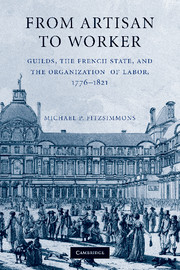Conclusion
Published online by Cambridge University Press: 06 July 2010
Summary
When one considers the strange [collection] of laws and institutions that governed industry before 1789, one is astonished that it was able to gain such importance: corporations, privileges, masterships, manufacturing regulations, pointless impediments – all seemingly intended to hold back development. The first step to take to make progress was therefore to free it (industry) from the shackles that kept it in infancy.
According to the jury named to screen items admitted into the 1819 exhibition, it (this step) contributed to the thriving state of our manufacturing today. We transcribe here its opinion in order to remove all doubts that could remain in the mind of some on the benefits it brought forth.
Claude-Anthelme Costaz Histoire de l'administration en FranceBy the eighteenth century guilds had been a prominent feature of urban life for centuries, providing a structure to labor and some degree of control over journeymen and apprentices – in effect, they served as an extension of the police. Corporations had been abolished in 1776, but after only a few months characterized by unnerving unrest among journeymen, they were reorganized. By May 1789, then, as the Estates-General opened, with memories of 1776 still relatively fresh, the position of guilds seemed secure.
Yet, just two months later, on August 4, the National Assembly unexpectedly launched a comprehensive attack on privilege and abolished guilds, which were perceived as beneficiaries of privilege. Even among the cascade of renunciations made during the meeting, stunning deputies and observers alike, the abolition of guilds stood out.
- Type
- Chapter
- Information
- From Artisan to WorkerGuilds, the French State, and the Organization of Labor, 1776–1821, pp. 256 - 264Publisher: Cambridge University PressPrint publication year: 2010



